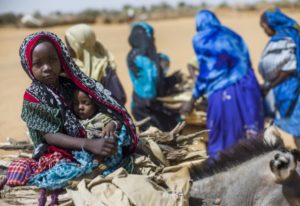
Access to quality health services is essential for women and newborns in refugee contexts. In times of conflict, displacement, or humanitarian emergency, neonatal and maternal health is often compromised and the availability of maternal, newborn, and family planning services becomes even more important.
In line with UNHCR’s mandate and with support from the Bill and Melinda Gates Foundation (BMGF), UNHCR has extended the “Saving Maternal and Newborn Lives in Refugee Settings” project to three further refugee situations in Cameroon, Niger and Chad. With the aim to improve newborn and maternal health, the two-year project is focusing on low cost, high impact maternal and newborn interventions, ensuring that every refugee mother and newborn has the chance to live a healthy life. This also includes quality family planning services, recognizing the important role of family planning in reducing maternal and neonatal morbidity and mortality, preventing unwanted pregnancies, reducing rates of abortion (including unsafe abortion), and reducing the risks of adolescent pregnancy.
A baseline assessment was conducted in the targeted refugee sites, including health facility assessments; interviews of program managers and front-line health providers to gather in-depth information about their practices, needs, and perceived gaps in care; and focus group discussions with community members which provided valuable insight into community perceptions of health services as well as traditional beliefs and practices.
Chad, Cameroon and Niger were chosen for this project due to their poor reproductive health indicators as well as high burden of refugee populations in the countries. Each of the three countries are facing similar challenges, including poorly funded health systems and under resourced and under staffed health facilities, particularly at the district hospital level. Remote locations, poor roads, and regular influxes of new refugees further complicate operations. Insecurity and violent attacks limit access and care provision, particularly in the Malian camps of Niger and Sudanese camps of Eastern Chad, some of which are only accessible with a military escort.